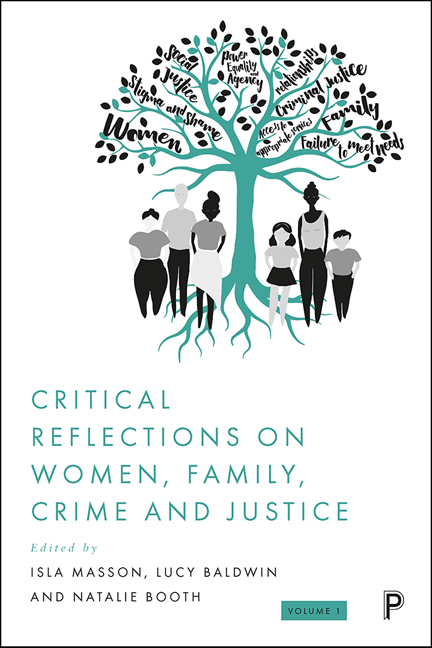Book contents
- Frontmatter
- Contents
- List of figures
- Notes on the contributors
- Acknowledgements
- Foreword: critical reflections from the Women, Family, Crime and Justice network
- 1 Starting the conversation: an introduction to the Women, Family, Crime and Justice network
- 2 Playing the game: women and community punishment
- 3 Harmful social and cultural practices that exist within South Asian communities in the UK and their impact on women
- 4 Exploring shame, love and healing within women’s recovery: an analysis of a trauma-specific intervention
- 5 Reducing the enduring harm of short terms of imprisonment
- 6 ‘Without it you’re lost’: examining the role and challenges of family engagement services in prisons
- 7 What are the challenges and opportunities for schools in supporting children of people in prison?
- 8 Impact and engagement work in the context of families of people in prison
- 9 Presence, voice and reflexivity in feminist and creative research: a personal and professional reflection
- 10 Service users being used: thoughts to the research community
- 11 Continuing the conversation: reflections from the Women, Family, Crime and Justice network
- Index
4 - Exploring shame, love and healing within women’s recovery: an analysis of a trauma-specific intervention
Published online by Cambridge University Press: 21 December 2021
- Frontmatter
- Contents
- List of figures
- Notes on the contributors
- Acknowledgements
- Foreword: critical reflections from the Women, Family, Crime and Justice network
- 1 Starting the conversation: an introduction to the Women, Family, Crime and Justice network
- 2 Playing the game: women and community punishment
- 3 Harmful social and cultural practices that exist within South Asian communities in the UK and their impact on women
- 4 Exploring shame, love and healing within women’s recovery: an analysis of a trauma-specific intervention
- 5 Reducing the enduring harm of short terms of imprisonment
- 6 ‘Without it you’re lost’: examining the role and challenges of family engagement services in prisons
- 7 What are the challenges and opportunities for schools in supporting children of people in prison?
- 8 Impact and engagement work in the context of families of people in prison
- 9 Presence, voice and reflexivity in feminist and creative research: a personal and professional reflection
- 10 Service users being used: thoughts to the research community
- 11 Continuing the conversation: reflections from the Women, Family, Crime and Justice network
- Index
Summary
Introduction
Within the field of criminology and women's recovery and rehabilitation there has been increasing interest among academics, practitioners and policy makers, to move towards a trauma-informed approach across the criminal justice system (Bloom and Covington, 2008; Bradley, 2017; Ministry of Justice, 2018; Jewkes et al, 2019; One Small Thing, 20191). This approach aims to recognise the ways in which trauma can manifest within the behaviour and lives of individuals. The trajectory of the ‘becoming trauma-informed’ movement, has steadily infiltrated women's services and policy strategies within the UK since the early 2000s.
The focus on women's vulnerabilities and experiences of previous trauma intensified following the release of the Corston Report (2007), which encouraged the greater use of safe women-only spaces, women's centres and tailored services. In order to improve engagement within such facilities, it was argued that centres should provide onsite childcare and access to multiple services within a ‘one-stop-shop’ environment, to better support women with a variety of needs (Gelsthorpe et al, 2007).
Women with histories and experiences of sex work are a hidden demographic and the statistics currently available are outdated. It is suggested that 21 per cent of women within one prison had experienced sex working (National Offender Management Service, 2012). Out of those women, 74 per cent specified that they did so, in order to fund a drug habit, while 26 per cent stated that they had been abused. Between 2011 and 2012 it was estimated that 723 women referred to women's centres were identified as needing sex-work-specific support due to their lived experiences (Prison Reform Trust, 2014).
However, there continues to be a paucity of research in academia, policy and practice to examine effective responses to the distinct and often trauma-infused experiences of women with sex-working histories.
Methodology
The data presented in this chapter was collected as part of a qualitative evaluation of the Griffin Programme. It was designed following a research project that examined support services for women with histories of sex work (Tate, 2015). The voices of women who had completed the programme, and staff who had facilitated the programme, were collected, in order to explore the impact, value and nuances from a dual perspective.
- Type
- Chapter
- Information
- Critical Reflections on Women, Family, Crime and Justice , pp. 57 - 80Publisher: Bristol University PressPrint publication year: 2021

